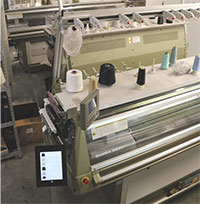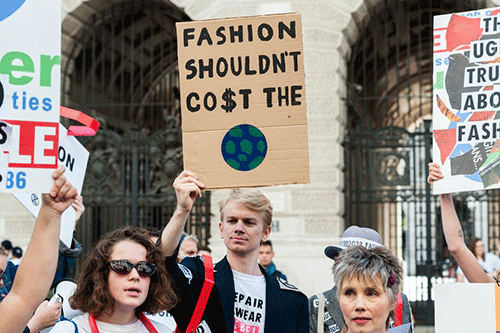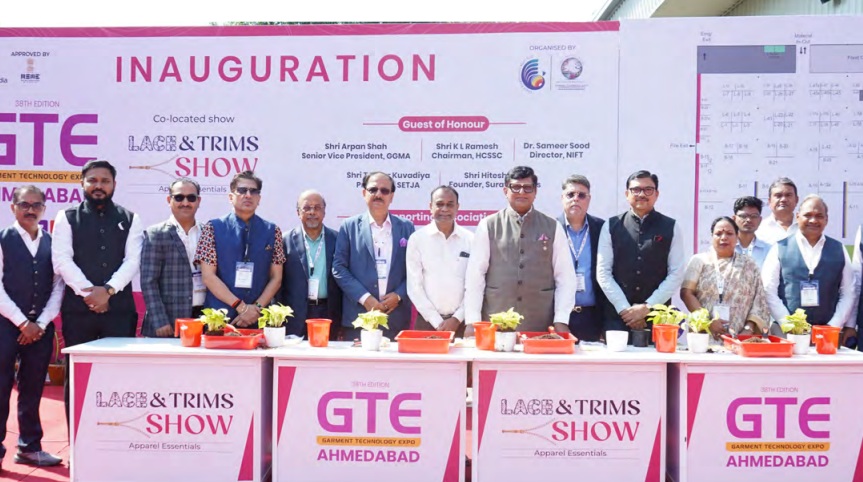FW
"Tailored Industry, Co-founded by Alex Tschopp, believes many knitwear brands today are forced to plan lengthy production cycles and undertake astronomically high order quantities which prevents them from launching new collections. Their chronic overproduction also results in vast quantities of unwanted apparel ending up in landfills which further compresses the company’s profit margins."
 Tailored Industry, Co-founded by Alex Tschopp, believes many knitwear brands today are forced to plan lengthy production cycles and undertake astronomically high order quantities which prevents them from launching new collections. Their chronic overproduction also results in vast quantities of unwanted apparel ending up in landfills which further compresses the company’s profit margins.
Tailored Industry, Co-founded by Alex Tschopp, believes many knitwear brands today are forced to plan lengthy production cycles and undertake astronomically high order quantities which prevents them from launching new collections. Their chronic overproduction also results in vast quantities of unwanted apparel ending up in landfills which further compresses the company’s profit margins.
The company believes it is time to set a new paradigm in knitwear production by mixing hardware and software for an efficient and flexible output. Tailored Industry already raised $650,000, and plans to further raise another $1or $2 million through seed funding. This will help it to triple its five-person team over the next year by onboarding additional engineers, programmers and operators to keep its 10 Shima Seiki 3D knitting machines running smoothly.
A full-service solution from apparel production
The Brooklyn facility of the company manufactures around 1,000 to 2,000 units of knitwear apparels every month. It produces a range of styles including sweaters, dresses, beanies, cardigans, blazers, tops, scarves and knit ties. It is building a cloud-based manufacturing platform to rapidly restock products “with very low risk in their inventory.
month. It produces a range of styles including sweaters, dresses, beanies, cardigans, blazers, tops, scarves and knit ties. It is building a cloud-based manufacturing platform to rapidly restock products “with very low risk in their inventory.
The company’s software facilities include a Shopify store that helps it to review order data for a new products, execute production and ship finished goods to customers in as little as five days. Its high-tech 3D-knitting machines reduce production waste, generating roughly 1 percent of the excess relative to other manufacturing techniques. The company offers a full-service solution for everything from yarn sourcing and knitting to finishing, packing and shipping. Its design template gives its clients new ideas while launching their designs if they don’t already have a style in mind.
Expanding its production model
Tailored has executed a pilot order for Gap Inc.’s new Hill City men’s active band—which could serve as a guinea pig for the Gap umbrella. As the company is being flooded with orders, it now plans to add 12 more knitting machines to its Brooklyn facility. However, its immediate plan includes opening a 100-machine factory in Brooklyn and expanding the lean production model to other close-to-customer regions surrounding the US coastline as it aims to make this location a model factory for other brands to emulate.
The British luxury group Stella McCartney has appointed as new CEO Gabriele Maggio, former general manager at Moschino and with a professional career in Gucci and Bottega Veneta. He has a long career in the fashion industry. Besides working in Moschino, Maggio has held roles in Gucci and Bottega Venetta, both owned by Kering. He will join his position on October 21 replacing Frederick Lukoff leaving the company in June to join Scotch & Soda as CEO.
Maggio joins a couple of months after the company signed a deal with LVMH. The luxury holding bought a stake of the designer’s company last June after Stella McCartney ended its 15-year-old relationship with Kering. The goal of this partnership is to accelerate Stella McCartney’s worldwide development in terms of business and strategy, while of course remaining faithful to its long-lasting commitment to sustainable and ethical luxury fashion.
As part of the deal, Stella McCartney joined the managing team at LVMH as consultant for Bernard Arnault in terms of sustainability. Arnault appointed that this was a decisive factor for the acquisition.
Stella McCartney held a 50-50 joint venture with Kering until last year, when the designer bought back 100% of the company. The move was also part of Kering divestment in non-strategic businesses to focus on Gucci and fast-growing brands like Saint Laurent and Bottega Veneta.
The Indonesian textile industry is upgrading its machinery from upstream to downstream levels. More than 85 per cent of the machines in color processing factories in textiles are more than 30 years old. Production costs are also higher because the machines use a lot of energy. For example, in the use of water, an old dyeing machine has a capacity of ten to one between water and fabric raw materials. In modern machines the ratio of water use can be 4.5: 1. Modern machines use less chemicals. When the water heats up a lot, the water itself requires a lot of energy. The ratio of chemicals that are put into it is higher.
The incentives provided to the processing sector are also focusing on the most crucial problem, namely dyeing. The biggest problem is currently in the dyeing sector. In addition to being inefficient in energy use, the dyeing sector also has to face high waste treatment costs because it is required to be environmentally friendly. More water and chemicals are used, which means that the costs for wastewater treatment plants are also high. Higher the ratio of water to chemicals, higher the costs.
The quality of Indonesian textile products has long been widely recognized by world fashion manufacturers.
For the third quarter Levi Strauss’ profit dropped four per cent. Net revenue rose 3.8 per cent. The denim apparel maker is struggling to grow its wholesale business in the US. Reduced shipments to off-price stores and the impact of a delayed acquisition of a South American distributor drove net revenue down about three per cent in the region, the first fall since the 165-year-old company went public in March. US wholesale was challenged, particularly the legacy department stores and chain stores. Levi’s has been focusing on selling directly to customers through its stores and online than through off-price retailers. Levi’s teamed up with model Chanel Iman and New York Giants player Sterling Shepard during the quarter to create an exclusive drop, launching limited merchandise, for e-commerce retailer Amazon’s fashion line.
Levi Strauss is known for its brands Levi’s, Dockers, Signature by Levi Strauss and Denizen. It is implementing a strategy aimed at significantly reducing overall water use. Its suppliers are already engaged–and deeply invested–in the effort to reduce water use. In water-stressed regions, suppliers have begun to install water-efficient machinery and recycle water. The company will help its suppliers identify worthwhile investments in water projects and, in doing so, help them be successful over the long term.
Driven by issues of environmental sustainability and material waste, Israeli digital dyeing start-up Twine Solutions has developed a technology for digitally dyeing threads. The technology penetrates into the fiber to give clothing manufacturers the quality they need.
The Petah Tikva-based company, co-founded by twin brothers Alon and Erez Moshe, offers the clothing industry two digital solutions to increase efficiency, boost sustainability and even enable improved personalisation of garments.
The digital thread dyeing machine itself only requires a normal electricity source and ink bought from the company. Unlike existing polluting methods of fabric dyeing, Twine’s machine does not use water at all, and can produce threads for knitting, embroidery and sewing.
With the ability to digitally dye according to exact customer needs, the system also cuts down the huge quantities of textile waste produced throughout the traditional supply chain. In the US alone, an estimated 12.7 million tonne of textile waste is sent to landfills annually.
 A new report by the non-profit advocacy organization Stand.Earth lists fashion as a top filthy industry and brands still “wearing last season’s greenwash” rather taking real action against polluting processes within the supply chain.
A new report by the non-profit advocacy organization Stand.Earth lists fashion as a top filthy industry and brands still “wearing last season’s greenwash” rather taking real action against polluting processes within the supply chain.
Besides accusations, the report also includes the commitments made by brands who have signed up to one of several climate change assessment/limiting initiatives, including the Sustainable Apparel Coalition, the UN Fashion Industry Charter for Climate Action and the G7 Fashion Pact. The report goes on to rank these commitments by the likelihood of achieving targets of reducing emissions needed to halt global warming to 1.5 degrees, in line with the UN Paris Agreement.
Carbon emission from brands
Initially, it assesses the commitment of brands to not only reduce their carbon emissions across the entire supply chain and operations but also their investment in renewable energies. The report declares that 8.1 per cent of global carbon emissions result from the fashion industry and this will increase nearly 60 per cent by 2030, at the current rate of growth, so renewable energy solutions are a critical imperative.
investment in renewable energies. The report declares that 8.1 per cent of global carbon emissions result from the fashion industry and this will increase nearly 60 per cent by 2030, at the current rate of growth, so renewable energy solutions are a critical imperative.
Impact on brands
In terms of relative impact, the brands on the list span Ganni, H&M, and LVMH and Kering groups. Earlier this year, the ‘Pulse of the Fashion Industry’ report (compiled by the Global Fashion Agenda, Boston Consulting Group and The Sustainable Apparel Coalition and released at the Copenhagen Fashion Summit), segmented the fashion industry by global market share. Entry price point fashion brands (e.g. Primark, H&M, and Zara) hold 43 of the global market share while mid-price brands account for 47 per cent. That leaves premium and luxury brands, including those in the LVMH and Kering stables and Ganni, at 10 per cent. Therefore, the ranking does not reveal the relative importance of the commitment of brands according to the impact they can actually have on climate change. So, if Zara, H&M, and Target, for example, managed to reduce their carbon emissions by 30 per cent it will be more than 1000 Ganni’s. The other point worth noting was the vast investment and innovation that garment manufacturers are making. The expansion of Leeds certified sustainable factories in Bangladesh, for example, has come at a huge cost to manufacturers and is entirely independent of brands.
Garment manufacturers on reduction of carbon emission
The also reveals, the largest segments of global fashion industry is actually shaped and driven by large-scale manufacturers serving the entry and mid-price point brands. And the scale at which some of these factories work dwarf the production quantities of entire brands. Pacific Jeans’ for example, has 5 garment factories in Bangladesh with 26,000 staff manufacturing 36 million garments a year for brands including Zara, H&M, Uniqlo and GAP. The climate change initiatives of a manufacturer like this far outweigh those of relatively small brands on this list, like GANT and Eileen Fisher. Soorty a vertical denim manufacturer making up to 6.5 million meters per month in their LEED platinum certified mill is an example of how pioneering sustainability initiatives can be achieved at huge scale. Ranking of the world’s largest garment manufacturers according to their initiatives to reduce carbon emissions and their use of renewable energy sources (along with the brands they manufacture for) would give far more clarity to this report.
Vidalia is going to revive selvedge denim production in the United States. The company has bought some 40 selvedge denim weaving machines from Cone, a famous selvedge denim mill in the US, which closed down in 2017. That means Vidalia will be a denim mill with selvedge production in the US after a very long time. Vidalia will make not only denim, but yarns, too, for sale. Everything produced by the mill will contain e3 sustainable cotton. Every yard of fabric, and every pound of yarn, will contain sustainably grown and traceable cotton from farmers around the US.
Vidalia Mills has a game plan to execute its operation in the US with open-end yarn spinning aimed to start up in November, selvedge denim production in December and ring-spun yarn in January next year.
Denim is an American fabric. With the closing of Cone Mills, American made denim came to an end. Bringing denim manufacturing back to the US is seen as providing an attractive, alternative sourcing opportunity for brands. The hope is this is the start of more domestic denim industry revival. Vidalia also plans to integrate a foam dye system from a Turkish manufacturer of air-conditioning systems for spinning, weaving and knitting mills.
Luxury brand Burberry has signed a partnership to sell its second-hand products through consignment marketplace The RealReal in the US. As per the partnership, customers will be able to sell their used garments and accessories back at selected Burberry stores in the US. Once the items are received, any necessary repairs or restorative work will be completed before they are put up for resale.
Customers will be able to buy the “pre-loved” items through The RealReal’s online platform or through Burberry’s personal shopping service at stores taking part in the pilot. The partnership comes after The RealReal’s annual report found that resale demand for Burberry brand items through its platform has increased 64 per cent year-on-year in 2019. Most searches through its site and app are made by Millennial and Gen Z shoppers.
If the pilot project, which is due to end on 31 January 2020, is successful, Burberry will explore the possibility of expanding the offering. For the trial, the British brand and The RealReal will make a joint donation to NGO Materials for the Arts, which educates students and the general public around "creative" reuse.
The British brand has offered after-care and repair services to consumers since it was founded in 1856, and last year handled 20,000 requests under these schemes. More recently, it has forged partnerships with handbag brand Elvis and Kresse and recycled materials specialist Aquafil to repurpose its leather offcuts etc.
For the first eight months of the year, US apparel imports from China were up 1.99 per cent year to year. US’ imports from across the world increased 5.76 per cent for the year to date though August. In the month, apparel imports rose just 0.15 per cent compared to July as imports patterns have been disrupted by companies looking to get goods in ahead of anticipated tariffs as trade wars simmer on multiple fronts. The increase reflected a gain in the goods deficit and a decrease in the services surplus. The largest trade deficits were recorded with China and the European Union.
US apparel imports from Vietnam were up 12.14 per cent. Bangladesh’s shipments rose 11.81 per cent in the period. Imports from India increased 8.19 per cent. Cambodia’s shipments were up 8.58 per cent Pakistan’s gained 8.56 per cent. Apparel imports from Honduras gained 11.91 per cent. Shipments from Nicaragua were up 12.7 per cent. Shipments from Haiti increased 16.09 per cent and those from Peru rose 7.76 per cent. Imports from Egypt rose 17.72 per cent. Those from Kenya were up 23.69 per cent. Madagascar was up 24.48 per cent and Ethiopia was up 90.98 per cent.
American Eagle Outfitters plans to accelerate its sustainability improvements and become carbon neutral by 2030. The company is committed to carbon reduction, water reduction and the use of more sustainable raw materials. AEO focuses on youth and its optimism toward the future, so building a better world for generations to come is fundamental to its values and purpose. It pledges to accelerate sustainability improvements across its entire organization, and throughout the supply chain, holding itself accountable through the adoption of science-based targets. As a leading retailer, it is dedicated to working across the industry to create systemic changes in garment manufacturing.
American Eagle’s sustainability goals include achieving carbon neutrality in all of its owned and operated facilities (offices, stores, distribution centers) and employee business travel by 2030, reducing carbon emissions by 40 per cent by 2030 and 60 per cent by 2040, ensuring that by 2023 50 per cent of water used in laundries is recycled, reducing water use in jeans production by 30 per cent and ensuring wastewater from water-intensive facilities is free from hazardous chemicals. In addition, all cotton used in products will be sustainably sourced and sourcing of sustainably produced viscose fibers will be increased. Customers will be encouraged to reduce apparel waste through jeans recycling in American Eagle stores.












